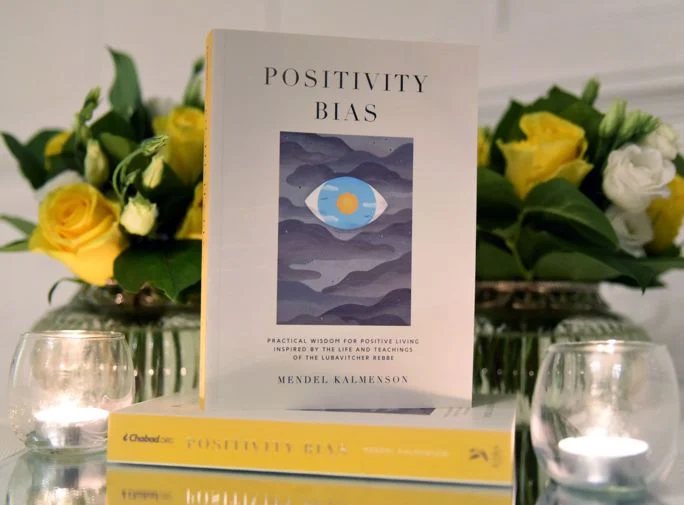
Positivity Bias: 50,000 Copies Later, Countless Souls Impacted
by Mendel Ehrenreich – chabad.org
Michelle L. was a typical almost-12-year-old girl, eagerly anticipating her bat mitzvah. As the big day drew nearer, all she could think of was her friends and family coming together to celebrate her joyous milestone.
Friday arrived and the synagogue quickly filled with those close to her for an uplifting Shabbat service and a seudah to follow. However, the happy occasion was marred by tragedy. At the hall, Michelle’s grandfather suddenly passed away.
“The service had just concluded. We went to the social hall, and he had a massive heart attack and passed away right there,” she recounted years later.
For many years, Michelle struggled with the catastrophe. She grappled with the profound sadness of losing her grandfather during such a pivotal moment in the life of a young Jewish girl. She often felt a deep sense of self-pity and questioned how such an event could occur at—of all times—her bat mitzvah, when her spiritual dimension was supposedly shining.
Later in life she found a book called Positivity Bias by Rabbi Mendel Kalmenson, and everything changed. The volume introduced her to the wisdom of the Rebbe, Rabbi Menachem M. Schneerson, of righteous memory, who taught that in this world, everything is a mixture of good and bad, and human beings have the ability to choose which aspects they will emphasize, contemplate, and pursue. Indeed, it was in the book that Michelle read a story that so closely mirrored her life experience that she felt it had been written for her:
A man sponsored the writing of a Torah scroll, and upon its completion invited the community to a festive meal in his home. “During the course of the celebration,” the book recounts, “a young woman suddenly fell ill and died. The host was shocked and devastated, to say the least. Unsurprisingly, as a result of this tragic event, he had some gnawing existential and spiritual questions that would not go away.”
He wrote a letter to the Rebbe asking how it could have been that a mitzvah could have played a role in such a tragedy, and whether there was any lesson he, as the host, should take from the fact that it had occurred in his home.
As Kalmenson writes, the Rebbe responded to the heartfelt letter point by point, to quote just a part of his answer:
“It is impossible for man, a finite creation, to comprehend all the reasons of the Infinite Creator. Indeed, we would not have a way of knowing even some of G‑d’s reasons were it not for the fact that G‑d, Himself, told us to seek them out in His holy Torah.
Furthermore, each and every individual has been granted a set amount of years of life on earth….
Based on these points, one can perhaps venture to say that had the departed one (peace be upon her) not been invited to the celebration, she would have found herself at the onset of her attack in completely different surroundings: On the street, in the company of strangers, without the presence of a doctor who is both a friend and a co-religionist, and without hearing words of encouragement and seeing the faces of friends and family in her final moments.”
Reading these words, Michelle suddenly had a whole new outlook on that painful episode. She felt she finally had a way forward.
Hers is but one of the thousands of lives changed since the 2019 publication of Kalmenson’s Positivity Bias: Practical Wisdom for Positive Living.
“Growing up, I started noticing a repeating pattern in the Rebbe’s teachings and writings, a persistent effort to redeem and recast different biblical characters and events in a positive light,” Kalmenson, who also directs Chabad-Lubavitch of Belgravia, London, tells Chabad.org. “The Rebbe’s mode and approach to this was ‘if only we train ourselves to look deeper, and beyond the often misguided behavior or negative event we can discover the hidden point of goodness and Divine providence within all people and events.’”
It was that guiding principle that finally brought peace to Michelle after reading Kalmenson’s book on the Rebbe’s approach to positivity. Instead of looking through a prism of negativity and self-pity, she found herself seeing the once-traumatic event differently. What was once a source of despair and alienation turned into a source of divine alignment and appreciation.
In a heartfelt letter to the author, she shared that where she once only saw the loneliness of the event, she could now appreciate that “my grandfather was not alone that evening. He was surrounded by so many people who loved him so much. He was able to be with all his family and friends before he passed and he got to see me celebrate my bat mitzvah.”
She had learned to adopt the Rebbe’s positivity bias.

The Rebbe on Positivity
When Kalmenson set out to write the book, he was well aware of the enormity of the assignment. The Rebbe’s teachings are vast. To date, more than 500 volumes have been published of his talks alone. During an average one of these talks, the Rebbe traversed many topics and discussions spanning the gamut of Torah, Jewish practice, social commentary, and more.
Growing up in a household that was permeated with the Rebbe’s Torah, Kalmenson is no stranger to the various modes of communication the Rebbe used. Over the years, Kalmenson first studied, then taught, the tremendous wealth of information, ideas and thoughts contained in the Rebbe’s teachings. After many such interactions, it became clear that when discussing a topic or idea, what remained consistent was the Rebbe’s choice of vocabulary and words. Rarely, if ever, did the Rebbe use a negative word or connotation if it could be avoided.
Kalmenson noticed that the Rebbe was setting the foundation for a poignant method of living and chose the name of the book to reflect this: Positivity Bias.
In its pages, the author shows that through personal audiences, written correspondences, public addresses, and the Torah he taught, the Rebbe was able to transform the “negativity bias” that had taken a hold of much of Jewish life.
The Rebbe highlighted the positive potential of the self, and the endless opportunities for goodness and G‑dliness for the average Jew—charting a path forward after World War II and the Holocaust, the near destruction of Eastern European Jewish life in the Soviet Union, and the cynical materialism of the 20th and 21st centuries.
“The Rebbe taught that every human being is deeply ingrained with goodness at his or her essence,” Kalmenson tells Chabad.org. ”We are a G‑dly species, and our mistakes don’t define or confine us.”
He did not just live by this ethos but made it his mission to share it with the world. This was not an insignificant or small part of the Rebbe’s worldview, but rather, an absolute modus operandi and cornerstone to all of his teachings and wisdom.
ASince the book’s release in 2019—it has been translated into Hebrew, Italian, French, Russian, Spanish, Portuguese, German, Italian, and Greek—this worldview has impacted countless individuals. In the months after publication, letters, phone calls, emails and word of mouth told the tale of a readership deeply impacted by the very positivity bias that drove the Rebbe’s rhetoric.

‘Reading These Insights May Have Saved My Life’
The Aleph Institute, an organization based in Surfside, Fla., that runs Jewish programming for Jews in the military and those who are incarcerated, sent copies to prisons, helping inmates find meaning in their confinement.
It’s no surprise that those in prison were deeply impacted by the Rebbe’s teachings. The Rebbe was an early advocate of criminal justice reform and spoke on multiple occasions about the cause. On one occasion, in a 1976 talk, when pointing out a fundamental flaw in incarceration policies that were disconnected from re-education and rehabilitation, the Rebbe explained:
“If a person is being held in prison, the goal should not be punishment but rather to give him the chance to reflect on the undesirable actions for which he was incarcerated. He should be allowed to learn, improve himself, and prepare for his release when he will commence an honest, peaceful, new life, having used his days in prison toward this end.
“For this to be a reality, a prisoner must be allowed to maintain a sense that he is created in the image of G‑d, he is a human being, who, if only he desires it, can be a reflection of G‑dliness in this world. One of the goals of the prison system is to help inmates to raise up their spirits and to encourage them, providing the sense to the degree possible, they are just as human as those who are free.”
This was the message that reached Jonah K., a man serving a life sentence in a prison in Hawaii. After years of good behavior, he was finally eligible to apply for parole. But when an old disciplinary action came up during his application, Jonah was immediately put into solitary confinement, eliminating any chance of release.
He was inconsolable, and as his mental health deteriorated, he felt tormented.
“Deep in my mind, my heart, and my spirit I was in despair. … I had seriously considered harming myself … ,” he wrote to Kalmenson of those dark times.
But at the perfect time, he received a copy of Positivity Bias via the Aleph initiative. “The Rebbe’s belief helped me through a very dark period,” he explained. “I was able to seek and maintain views of my world in a positive light. … Reading these insights may have saved my life.”
Henri Morris, an incarcerated man struggling with constant thoughts of negativity, was also deeply inspired by the book. After reading through it, he said, “I am now re-reading it and page by page, am underlining all of the relevant portions which have so affected me—items such as the Rebbe’s words that ‘I worked on myself to look at things in a positive light, otherwise I could not have survived.’ How very profound and how very important to all of us who have been locked up, regardless of the reason why.”

Impact on all Walks of Life
According to Kalmenson, “I felt a responsibility to share this discovery with the world. It was this profound message that every human being possesses an inner point of goodness and G‑dliness that is incorruptible. We must operate out of faith and optimism, and not judgment and cynicism.”
The book has been eagerly welcomed by members of the clergy as well. Rabbi Haskel Lookstein, rabbi emeritus of Congregation Kehilath Jeshurun on the Upper East Side of Manhattan, said, “It is a very important book, how the Rebbe saw everything in a positive vein. During the Rebbe’s inaugural address, on a cold winter night in 1951, in the shadow of the Holocaust, with the background of an impoverished State of Israel, in a crisis of assimilation of American Jewry, the Rebbe referred to the world as G‑d’s garden.”
Positivity Bias is now a household name, a recognized term, and the basis for inspiration, learning and change for so many across the world.
It is more than just a book; it is a way for people to understand the most important foundations of belief and deep insights into the spiritual and practical positivity learned from the Rebbe.
















